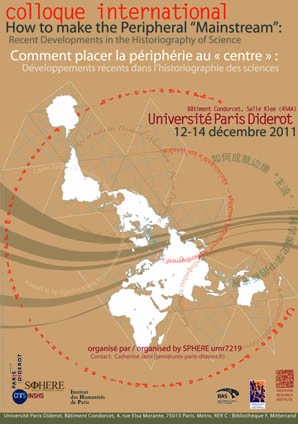

University Paris Diderot,
room Klee (454A), building Condorcet,
75013 Paris.
Contact : Catherine Jami
jami[at]univ-paris-diderot.fr
(SPHERE)
Argument
Organisation Comittee
Program
Access
ARGUMENT
Each participant in the workshop will present the state of his or her own research field or some key moments of the historiography. Alternatively, he or she might discuss aspects of his or her own recent research that can help to bring out points of convergence, paths that have been opened and that can be further explored, and also obstacles that have been encountered. We hope that we can work collectively on articulating proposals that should contribute to a faster integration of our work and of our research questions into what is perceived as the “mainstream” history of science. For we are convinced that our work should contribute to challenging the traditional dichotomy between “the West and the rest”—a dichotomy devoid of justification— as well as to advancing a reflection on “local and global”, which is relevant to all in our profession.
The conference will open with a proposal for approaching the history of science on the global scale. The rest of the first day will be devoted to confronting studies that aim at locating science and tracing its circulation to studies that apply the same approach to the historiography.
During the second day, a session will be devoted to mathematics, presenting both the ways in which politics has shaped the historiography and proposals for renewing this historiography ; another session will focus on the processes of construction of “the West” as central to modern science, and to the readings of texts stemming from other scientific traditions that have participated in these processes. The last day will be devoted to new historiographical proposals, on the one hand in the field of “Science and empires”, on the other hand in studies devoted to texts that traditional historiography has labelled as pertaining to “oriental sciences”.
Organisation Committee
MEMBERS OF THE COMMITTEE
- Catherine Jami, Directrice de recherche au CNRS, responsable du colloque
- Florence Bretelle-Establet, Chargée de recherche au CNRS
- Karine Chemla, Directrice de recherche au CNRS
- Pascal Crozet, Directeur de recherche au CNRS,
- Guillaume Lachenal, Maître de conférence, Université de Paris-Diderot
- Patrick Petitjean, Chargé de recherche au CNRS
PROGRAM
9 H 30 INTRODUCTION
OPENING
Working on a global scale
Ronald Numbers (University of Wisconsin, Madison)
Science and Religion around the World
10 H 30 – 13 H SESSION 1
Locating the history of science, tracing its circulation
Fabio Bevilacqua (University of Pavia)
History and meaning of the principle of energy conservation : going back to the Classics
Agathe Keller (SPHERE, CNRS, Paris & ERC PROJECT SAW)
Of numbers and languages : traveling histories on the origins of the decimal place value notation (18th – 20th century)
Annette Vogt (MPIWG, Berlin)
Gender studies in East and West Europe – where do we stand ?
14 H 15 – 18 H SESSION 2
Locating science, tracing its circulation
Michio Yano (Kyoto Sangyo University)
The comparative study of calendar making in Asia
Frank James (The Royal Institution, London)
Faraday, the Royal Institution and the British Empire
Alexey Postnikov (Russian Academy of Sciences)
George Bogle, the first British envoy to Bhutan and Tibet (1774-1775) : the importance of his mission for his contemporaries and subsequent participants of the Great Game in Asia
Ana Rosa Barahona Etcheverria (UNAM, Mexico City)
Mendelism in the field. The case of genetics in Mexican agriculture
Irina Gouzevitch (EHESS, Centre Maurice Halbwachs, Paris)
Influence versus circulation : testing an antithesis in the history of ‘cultural transfers’ – the case of 18th century Russia
TUESDAY 13 DECEMBER
9 H 30 – 12 H 30 SESSION 3
Focusing on a discipline : mathematics
Hélène Gispert (GHDSO, Université de Paris-Sud)
A new agenda for the history of early 20th century (western) mathematics : re-examining those excluded from the dominant narrative of mathematical modernity
Karine Chemla (SPHERE, CNRS, Paris & ERC PROJECT SAW)
The divide between proof and computation : historiographic and historical remarks
Andrea Bréard (University of Lille 1 & IKFG, Erlangen)
Can archival sources and everyday encyclopedias do more than complement the picture of mathematical practice in China ?
Liu Dun (IHNS, Beijing)
How did Archimedes become a patriotic hero in late Qing China ?
14 H 30 – 17 H SESSION 4
Neither “Oriental” nor modern : new readings of old materials
Joachim Kurtz (University of Heidelberg)
De-modernizing the History of Logic in China
Christopher Cullen (Needham Research Institute, Cambridge)
Re-centering ancient Chinese science : the role of recently discovered manuscript sources
Sonja Brentjes (University of Seville)
Narratives of knowledge in Islamic societies : what do they tell us about scholars and their contexts ?
WEDNESDAY 14 DECEMBER
9 H 30 – 12 H 30 SESSION 5
“Dewesternising” Science and empires
Efthymios Nicolaidis (National Hellenic Research Foundation, Athens)
Conspicuous by its absence : Byzantium in the historiography of science
Catherine Jami (SPHERE, CNRS, Paris)
"Science and empires" seen from Asia : bringing continental empires into the narrative
Michael Osborne (Oregon State University)
Provincial and regional contexts of the French Empire
Guillaume Lachenal (SPHERE, University of Paris-Diderot)
The history and memory of science in Africa
14 H 30 – 17 H SESSION 6
How the “mainstream” has been constructed
Pascal Crozet (SPHERE, CNRS, Paris)
On the historiography of Arabic science
Florence Bretelle-Establet (SPHERE, CNRS, Paris)
Working on the margins : bringing out the various processes of marginalisation of the sources of history of science
Mehrnaz Katouzian Safadi (SPHERE, CNRS, Paris)
How the words and style of medieval Arabic texts have influenced historians of science
16 H 30 CONCLUSION
Campus Paris Rive gauche (PRG), building Condorcet,
4, rue Elsa Morante, 75013 Paris. Map.
Metro line 14, RER C : station Bibliothèque François Mitterrand.
Bus : 62, 89, 325, 64, stop : Avenue de France.





